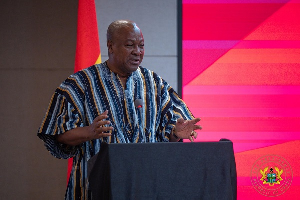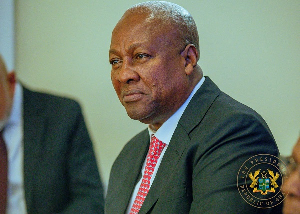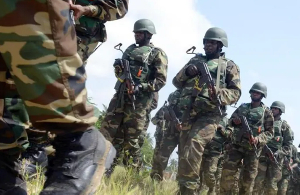 THE vice-president, Professor Atta Mills, on Monday November 6 2000, met with retired ex-members of the senior national team, the Black Stars, in a meeting dubbed the 1st convention of retired footballers at the Accra Sport Stadium.
THE vice-president, Professor Atta Mills, on Monday November 6 2000, met with retired ex-members of the senior national team, the Black Stars, in a meeting dubbed the 1st convention of retired footballers at the Accra Sport Stadium.
At that historic meeting, some of the most outstanding members who donned the national jersey in the past were honoured with plaques and citations in line with the sagacious saying that a nation that does not honour her heroes is not worth dying for.
Ghanaians love their senior national team, the Black Stars, with near passion. Thus even in their moment of retirement, the fans still accord them the best of respects and honour reserved only for true heroes.
Despite the above, only a few Ghanaians know the saga behind the Black Stars, some of their major achievements etc. For the benefit of the new students in Ghana soccer, an attempt would be made at raking some of the historic events chalked by the Stars.
Ghana, then known as the Gold Coast, played her first international match against Nigeria in 1945, winning by 3-0 in Accra. The national team was then called Gold Coast Eleven.
Upon the attainment of independence, the first football league and knockout competitions were successfully organised in 1958, and that marked the beginning of some radical changes in Ghana football. Ghana Eleven was the new name adopted after independence.
It was however in the first week of October , 1960, that some outstanding players in that year's football season were called to national duty at the CYO Park at Nsawam, where the magical name Black Stars was conferred on them by the late doyen of Ghana Soccer and sports, Mr Ohene Djan.
The original 18 members of the Black Stars group were C. K. Gyamfi, captain, Aggrey Fynn, Addo Odametey, E. O. Oblitey, Ofei Dodoo, Adoquaye Laryea, E. Obadzen, Baba Yara, Dogo Moro, W. K. Mfum, Mohammed Salisu, Kwao Baffoe, Asebi Boakye, Kwame Addarkwah, Kwame Appiah, Ben Simmons (Acheampong), A. R. Kassum and R. Bunyah.
From 1960 onwards, the sky became the limit for the national team and aptly the first international trophy the Black Stars won was the Jalco Cup which they won for keeps later on To commemorate Nigeria's independence in 1960, Dr Kwame Nkrumah, the ex-president of Ghana, presented a cup called the Gold Cup for a competition by West African states in Nigeria.
Both Ghana and Nigeria qualified for the finals which was won 3-0 by the Black Stars. The soccer giants from West Africa then decided to extend their empire beyond their region by annexing the African Cup of nations trophy in 1963 in Accra under the captainship of skipper Aggrey Fynn and coach C. K. Gyamfi.
In 1965, they became the first nation to retain the African title in Tunis, Tunisia, once again under the tutelage of Mr C. K. Gyamfi.
The twinkle, twinkle tittle stars, as the 1965 team was referred to, was captained by Addo Odametey. Ghana under skipper Wilberforce Mfum narrowly missed winning the coveted African trophy for keeps in 1968 in Addis Ababa, Ethiopia, under very bizzare officiating.
They placed second to claim t he silver medal. Under skipper John Eshun in 1970 , Ghana was again robbed in the grand final when they lost to homesters, Sudan, with officiating being worse than what obtained in Ethiopia 1968.
When the CAN tournament was staged in Ghana again in 1978, the Black Stars, led by Awuley Quaye, won the African Cup for keeps.
The team was coached by Osam Duodu and Tony Eghan. In 1982, the glittering princes of African soccer went to the desert city of Tripoli, where they snatched the cup from their hosts in a memorable final.
The captain's band was worn by Emmanuel Quarshie with Mr C. K. Gyamfi once again directing affairs from the touch line. Incidentally that was the last important international trophy that the Black Stars won for this nation.
The Stars' last appearance in the CAN grand final was in 1992 in Senegal where they placed second again, losing to Ivory Coast on penalties.
The team was captained by Abedi Pele who is on record as the longest serving captain in the Stars' history.
Clearly, no national team in Africa has been more successful than the Black Stars on the African terrain, given their impressive chain of first and second placements in CAN competitions, and should have been one of the first black Africa teams to have taken centre stage in the world cup competition It is never too late to achieve that honour for mother Ghana.
What they failed to achieve as players, could be achieved as coaches or inspirers to the present day Stars. Happily a lot of the ex-Black Stars are in football coaching.
All the rest, through their retired players association, could pay visits to the present stars, especially when they assemble to play World Cup matches, and inspire them to victory.
They could also form a "think tank" to offer useful suggestions to the national team handlers and our local football regulatory body, GFA.
The number of players who have played for this nation are perhaps too many to enumerate in this piece, but those who had the honour of leading the team but failed to win CAN trophies or silver medals could be recalled.
They are Kwasi Owusu, Kofi Bruce, Issac Paha, Adolf Armah, Abdul Razak, Opoku Nti, Kwasi Appiah etc. Past Black Stars players who have won African best player awards are Ibrahim Sunday, Abdul Razak, and Abedi Pele (three times).
Unfortunately some of the old stars are finding life very difficult after serving this nation so diligently. In view of the above, better ways of rewarding them should be found and instituted, to serve as impetus to the up and coming internationals.
Soccer News of Friday, 17 November 2000
Source: GNA












